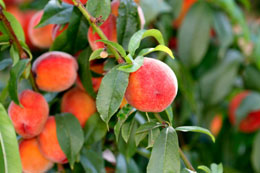In the olden days, the goodness of a peach fruit was such that it traveled far and wide from China to other parts of the world. Here's a look at some interesting facts about the peach tree and how its fruit is still loved all over.

Now, wouldn't you love to bite into a juicy and ripe peach fruit? It is a favorite with everybody as it is extremely delicious and is used in a variety of recipes as well. Peach trees are also botanically known as the Prunus persica.
Interesting Facts
As mentioned before, peaches have originated in China. These were grown in the Northern areas in the early years. Although the scientific name suggest that they originated in Persia, there is a different story altogether regarding their origin. Some of the wild ones, such as Maotao or the Yietao are still grown in some of the really remote areas of China. They soon became a symbol of fertility in China and also a way of showing one's affection. This is probably why brides in China carry their blossoms.
The Romans named them as the Persian Apples. This happened once the ripe ones traveled out of China and the Romans probably named them after the country that brought them to the West. The easiest way to increase their cultivation was by transporting the seeds of the peach plant. These soon were seen in America during the American Revolution. The popularity of the peach trees because of the juicy fruit grew to such an extent that it even found a place in the ships that belonged to the Spanish explorers. This fruit even derived feminine names in France. All their varieties were fondly given different names. This could probably be due to the fact that they were associated with females solely due to the beauty factor. Such was the popularity of this tree that Georgia was named the Peach State because of their successful cultivation of the peach trees which resulted in an abundance of the fruit as well.
This tree is decidous in nature and belong to the sub family of Prunoideae. The term deciduous is used to refer to trees that lose their leaves occasionally or seasonally. It also has a tendency to drop those parts that are not needed; this happens when the main objective of that particular part of the tree has been accomplished. These trees grow to a height of about 5-10 m. The leaves are around 7-15 cm in length and are lanceolate. This term is used to describe the shape of the leaves. The leaves are wider in the middle area. They have the blossoming of flowers in early spring. The flowers grow either single or in pairs. These are around 2.5 to 3 cm in diameter and are pink in color. The flowers have five petals.
The fruits have an outer fleshy part. This surrounds a shell of an endocarp, which contains the seed. This seed is oval in shape and is around 1.5 - 2 cm in length. The scientific term for this variety is known as drupe. The yellowish or white flesh of this fruit has a pleasing aroma. The fruit that has white flesh is generally very sweet to taste as compared to the one that has yellow flesh. Those with yellow flesh have a slight acidic tang to it. Such cultivated peaches are known as the freestone and the clingstone varieties. This variety also depends on the fact if the flesh sticks to the stone.
Nutrition Facts
Peaches are rich source of vitamin A,B, and C. They are not very high in calories. One medium-sized peach contains about 40 calories. Their juice is a very good moisturizer, and hence is found in many cosmetics. The peach pit contains hydrocyanic acid which may be harmful, if had in excess. However, not many people have it as it doesn't taste good. So, it is not something to worry about. This fruit is a good stress reliever, and is also known to reduce anxiety. It also aids digestion as it contains fiber. Further, a recent study shows that extracts from red lady peach, a yellow-fleshed variety of this fruit may stop growth of some cancer cells. This is because of presence of chlorogenic and neochlorogenic acid in the peach extract. They appear to stop breast cancer cell lines from growing without harming normal cells.
So, now you have a fair idea about the peach fruit and interesting facts associated with it. With summers just around the corner, we hope you are going to enjoy this juicy fruit the most and dish out new recipes with it.






 Now, wouldn't you love to bite into a juicy and ripe peach fruit? It is a favorite with everybody as it is extremely delicious and is used in a variety of recipes as well. Peach trees are also botanically known as the Prunus persica.
Now, wouldn't you love to bite into a juicy and ripe peach fruit? It is a favorite with everybody as it is extremely delicious and is used in a variety of recipes as well. Peach trees are also botanically known as the Prunus persica.